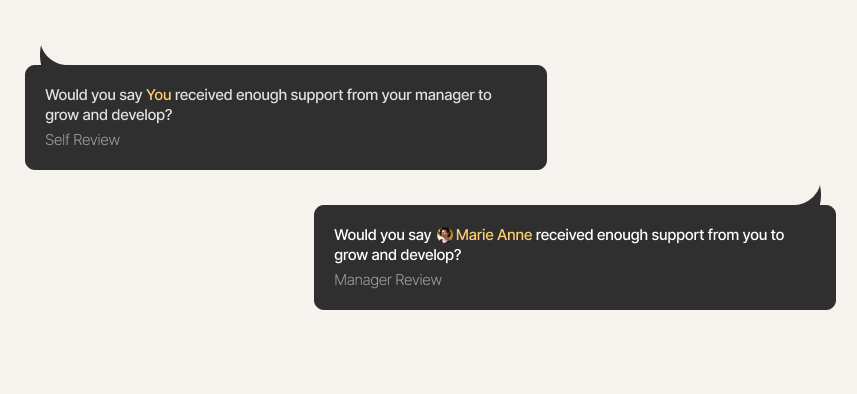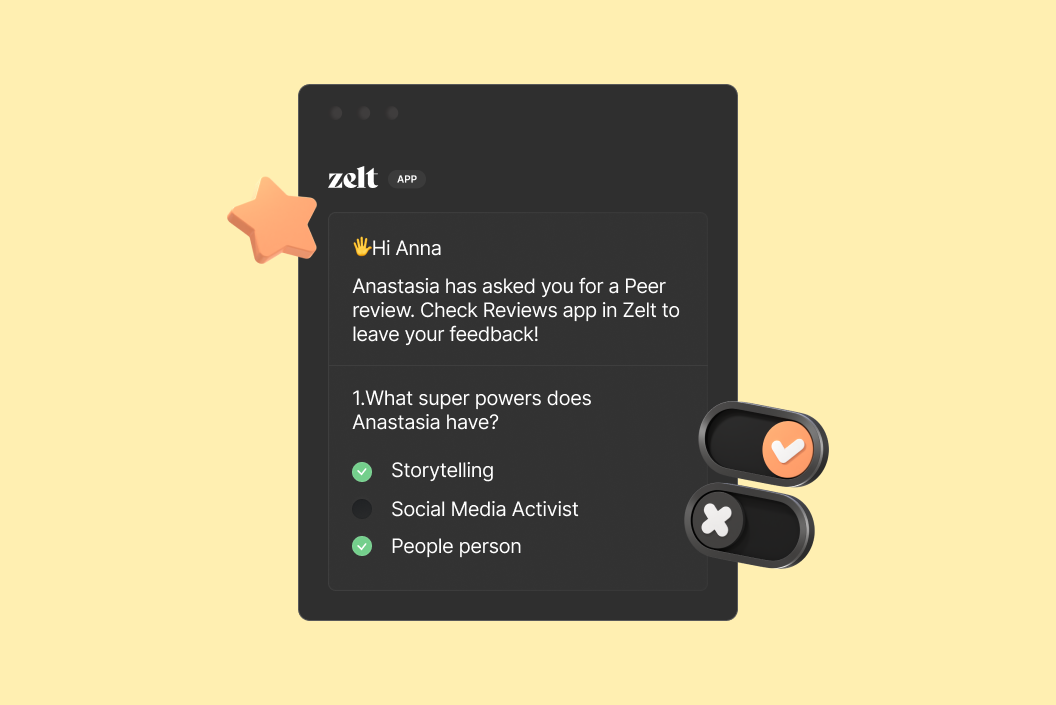Zelt introduces Growth app that will enable your company to focus on people’s performance effectively. There have been multiple studies conducted to establish the importance of open communication between leadership and their teams as well as seeing the results from timely feedback exchange. A study concluded that regular feedback and performance reviews had a direct impact on lowering employee churn, which is a very costly yet common problem for companies today. Gen Z are also asking for more regular constructive feedback throughout the year, so traditional annual appraisals should be a thing of the past. When employers focus on developing people, making it one of company’s strategic goals, they benefit from increased employee engagement.
Create a questionnaire that works for all
With Zelt you only ever need to create a questionnaire once, and we will help adjust the wording of each question for different roles – from Managers to Peers. This allows you to ensure consistency in the way you collect feedback from different levels in the team, without having to create 100 Google Forms.

What questions to ask in a Review
The most serious mistakes are not being made as a result of wrong answers. The truly dangerous thing is asking the wrong questions
Peter Drucker, A social ecologist, writer, consultant, and retired professor
There are different ways to approach feedback exchange and ultimately a lot of it will come down to your company culture. However we through it’s worth re-capping the types of questions that can be used and what insights can be uncovered by them. Perhaps this will serve as an inspiration for your next review!
Multiple choice
Multiple choice is great for objectivity. The options that you will provide for the participants will help them focus on the question, while reducing any subjective biases.
Questions that offer multiple options for selecting are also great for quick assessment. It is much easier to click a few options and move on to the next question without having to write a lot of comments.
Some examples of important questions that employers should ask employees during a performance review or a survey:
- Which of the following factors most significantly contribute to your overall job satisfaction? Select all that apply.
- Work-life balance
- Compensation and benefits
- Opportunities for growth and advancement
- Positive work environment and company culture
- Recognition and rewards
- Collaboration and teamwork
- Job security
- Company culture
- Other (Please comment which ones)
- Which factors, if improved, would enhance your job satisfaction? Select all that apply.
- Increased compensation or benefits
- Better work-life balance initiatives
- More opportunities for professional development
- Enhanced employee recognition
- Improved communication channels
- Strengthened team collaboration and support
- Addressing workplace stress or workload issues
- Implementing more inclusive and diverse practices
- Upgrading work equipment or tools
- Other (Please comment which ones)
- What factors would contribute to your sense of career progression in your current role? Select all that apply.
- Opportunities for skill development and training
- Increasing responsibilities and challenging assignments
- Clear career advancement paths
- Regular performance evaluations and feedback
- Mentorship or coaching programs
- Exposure to new projects or initiatives
- Leadership and decision-making responsibilities
- Collaborative projects with other departments
- Recognition for achievements and contributions
- Other (Please comment which ones)

Single choice
Single choice questions are the most common style of questions when it comes to surveys. You can create a quick survey in Zelt and use a bunch of single choice questions and this approach has a few distinct benefits:
- Single choice questions actually increase engagement and participation rates, as they have a relatively reduced cognitive load, simple to understand and answer.
- Answers are easier to analyse quantitatively.
- Collect answers fast from more employees.
- Easy to compare over time and spot trends.
Some examples of important questions that employers should ask employees during a performance review or a survey:
- What is your preferred way of receiving feedback from your manager? (Provide options)
- What is your preferred way of giving feedback to your manager and peers? (Provide options)
- Which one of the company values do you find most relatable/important? (Provide options with your company values)
- If you were to take on additional training during work hours, which skill would you like to focus on? (Provide options)
- What is one thing your manager should start doing? (Provide options)
- What is one thing your manager should stop doing? (Provide options)
Single choice questions can be thought-provoking. If in your scenario a single answer feels like too little information – select “Allow additional comments” and ask participants to provide examples or explanations when you create a form on Zelt.
Scale questions
Scale questions are great for measuring attitudes and degrees of feelings that employees have towards a certain topic. Scale questions have similar benefits to single choice questions. Additionally if you use the same scale method throughout the review you can take employees from a big bulk of questions without overwhelming them. From “Very satisfied” to “Not satisfied at all” or “Strongly agree” to “Strongly disagree” or “A lot” to “A little”. You have the freedom to describe the range when you are asking a question.
Some examples of important questions that employers should ask employees during a performance review or a survey:
Questions:
- How satisfied are you with the level of communication and transparency within the company?
- To what extent do you believe that the company values and recognises your contributions?
- How supported do you feel in terms of receiving necessary training and development opportunities?
- To what extent do you feel that the leadership encourages collaboration and teamwork among employees?
- How effective is the performance management process in providing meaningful feedback and recognising achievements?
Statements:
(use Strongly agree to Strongly disagree or a similar scale)
- I feel valued and appreciated in my role.
- My manager provides clear expectations and feedback regarding my performance.
- The company provides opportunities for professional growth and development.
- I have a good work-life balance in my current role.
- The company values and promotes diversity and inclusion.
- I feel supported by my colleagues and team members in achieving my work goals.
- The company provides adequate resources and tools to perform my job effectively.
- The company fosters a positive and inclusive work culture.
- My workload is manageable and allows me to meet deadlines effectively.

Open-ended questions
Open ended questions are great for in-depth and rich responses. Open-ended questions allow respondents to provide detailed and nuanced responses in their own words. They have the freedom to express their thoughts, ideas, and experiences without being limited to predetermined options. This provides deeper insights into employee perceptions, experiences, and suggestions.
Open-ended questions can uncover unexpected themes or insights that may not have been captured through closed-ended questions. They allow respondents to bring up perspectives or concerns that may not have been considered in the survey design, providing valuable feedback for improvement or addressing unaddressed issues.
More features coming soon:
- Question bank powered by ChatGPT
- Get over-time trends and spot patterns
- Slack bot integration